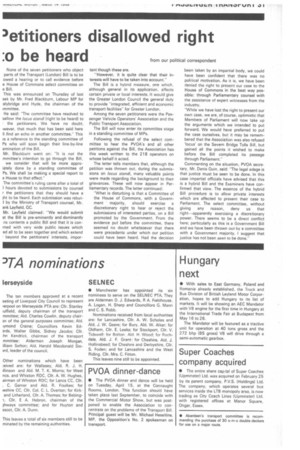'etitioners disallowed right
Page 33

If you've noticed an error in this article please click here to report it so we can fix it.
:o be heard from our political correspondent
None of the seven petitioners who object parts of the Transport (London) Bill is to be owed a hearing or to call evidence before e House of Commons select committee on e Bill.
This was announced on Thursday of last aek by Mr. Fred Blackburn, Labour MP for alybridge and Hyde, the chairman of the ■ mmittee.
He said: 'The committee have resolved to sallow the locus standi (right to be heard) to the petitioners. We have no doubt, lwever, that much that has been said here II find an echo in another committee." This is a reference to the standing committee of Ps who will soon begin their line-by-line amination of the Bill.
Mr. Blackburn went on: "It is not the mmittee's intention to go through the Bill,
we consider that will be more approiately done by a standing committee of Ps. We shall be making a special report to e House to that effect."
The committee's ruling came after a total of hours devoted to submissions by counsel r the petitioners that they should have a iht to be heard. Each submission was rebut by the Ministry of Transport counsel, Mr. ank Layfield, QC.
Mr. Layfield claimed: "We would submit at the Bill is pre-eminently and dominantly its contents a public Bill and that it is conred with very wide public issues which ed all to be seen together and which extend • beyond the petitioners' interests, impor tant though these are.
"However, it is quite clear that their interests will have to be taken into account."
The Bill is a hybrid measure, one which, although general in its application, affects certain private or local interests. It would give the Greater London Council the general duty to provide "integrated, efficient and economic transport facilities" for Greater London.
Among the seven petitioners were the Passenger Vehicle Operators' Association and the Public Transport Association.
The Bill will now enter its committee stage in a standing committee of MPs.
Following the refusal of the select committee to hear the PV0A's and all other petitions against the Bill, the Association has this week written to the 218 operators on whose behalf it acted.
The letter tells members that, although the petition was thrown out, during the submissions on locus standi, many valuable points were made regarding the background to their grievances. These will now appear in Parliamentary records. The letter continued: "What is disturbing is that a Committee of the House of Commons, with a Govern ment • majority, should exercise a discretionary right to hear or reject the submissions of interested parties, on a Bill promoted by the Government. From the evidence put before the committee, there seemed no doubt whatsoever that there were precedents under which our petition could have been heard. Had the decision been taken by an impartial body, we could have been confident that there was no political motivation. As it is, we have been denied the right to present our case to the House of Commons in the best way possible: through Parliamentary counsel with the assistance of expert witnesses from the industry.
-While we have lost the right to present our own case, we are, of course, optimistic that Members of Parliament will now take up the arguments which we intended to put forward. We would have preferred to put the case ourselves, but it may be remembered that the Association was also refused 'locus' on the Severn Bridge Tolls Bill, but gained all the points it wished to make before the Bill completed its passage through Parliament."
Commenting on the situation, PVOA secretary, Mr. Denis Quin, said: "The legal adage is that justice must be seen to be done. In this case impartial officials have advised that this is a hybrid Bill and the Examiners have confirmed that view. The essence of the hybrid Bill procedure is to allow private interests which are affected to present their case to Parliament. The select committee, without giving any reason, deny us that right-apparently exercising a discretionary power. There seems to be a direct conflict here; particularly as this is a Government Bill and we have been thrown out by a committee with a Government majority. I suggest that justice has not been seen to be done."




















































































































